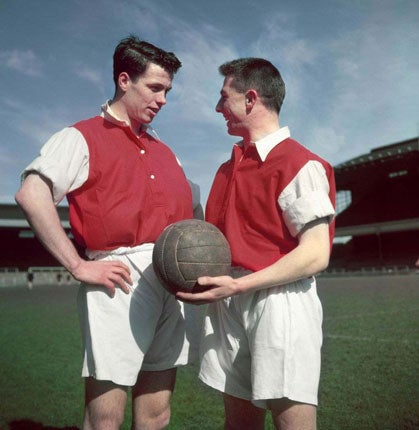Joe Haverty: Skilful Arsenal and Republic of Ireland left-winger known for his trickery and dribbling

Your support helps us to tell the story
From reproductive rights to climate change to Big Tech, The Independent is on the ground when the story is developing. Whether it's investigating the financials of Elon Musk's pro-Trump PAC or producing our latest documentary, 'The A Word', which shines a light on the American women fighting for reproductive rights, we know how important it is to parse out the facts from the messaging.
At such a critical moment in US history, we need reporters on the ground. Your donation allows us to keep sending journalists to speak to both sides of the story.
The Independent is trusted by Americans across the entire political spectrum. And unlike many other quality news outlets, we choose not to lock Americans out of our reporting and analysis with paywalls. We believe quality journalism should be available to everyone, paid for by those who can afford it.
Your support makes all the difference.There was an impudent twinkle about the football of the tiny Irish winger Joe Haverty which was sorely needed during a distinctly lacklustre interlude in Arsenal's history.
Occasionally the 5ft 3in Dubliner, who wore the Gunners' No 11 shirt on and off throughout the second half of the 1950s and into the following decade, overdid his trademark trickery, losing the ball and with it the team's attacking impetus. When that happened there would be catcalls from the terraces, but such was his charm, as both performer and personality, that frequently he redeemed himself with a sudden enchanting manoeuvre, and once more he was the laughing left-winger who could dribble his way into all but the hardest of hearts.
Haverty was recruited by Arsenal as an 18-year-old in the summer of 1954 from St Patrick's Athletic, one of his home city's leading clubs, and the Highbury manager Tom Whittaker was so impressed by his potential that he pitched him into top-flight action that August. It soon became evident that although the newcomer was a remarkably skilful manipulator of a football, he was not ready for a regular berth at a time when the Gunners were going through a difficult period of transition following the break-up of their 1952-53 title-winning team.
Thus it was not until 1956-57 that Haverty was granted a regular run in the First Division, by which time he had made an explosive entry on to the international stage, scoring for the Republic of Ireland with a rasping volley in a 4-1 triumph over the Netherlands. That debut strike was followed by another on his third outing in emerald green, though this prolific strike rate would not be maintained over the next decade of intermittent service to his country: he finished with only three goals in his 32 games.
Still, Haverty's form earned him a place in the London XI which contested the first Inter-Cities Fairs Cup, the forerunner to the modern Uefa Cup, and he scored against Lausanne Sports in the semi-final, though he was not picked for the 1958 final against Barcelona.
Back at domestic level, a combination of managerial experiments and recurring back problems limited his input until 1959-60, when he enjoyed the most productive season of his life, missing only a handful of games and contributing eight League goals. He set up plenty, too, for the likes of his fellow attackers David Herd, Jimmy Bloomfield and Vic Groves, continuing to please the crowd with his pace, guile and knack of crossing accurately. But Arsenal, now managed by George Swindin, were mired in mid-table mediocrity.
Perhaps understandably in view of his size, "Little Joe" – nicknamed after a character in the popular television western series Bonanza – was not too keen on mixing it physically with muscular defenders and he had a distinctive way of hopping from their path. This habit was marked one yuletide by the arrival at Highbury of a Christmas card addressed to Haverty picturing a spectacularly agile kangaroo. To his credit, he laughed louder at the joke than anyone else, a reflection of his engagingly easy-going nature.
However, such personal popularity could not preserve his place, as an increasingly desperate Swindin sought a more consistent player to patrol the left touchline. In August 1961, still aged only 25, Haverty was sold to their top-tier rivals Blackburn Rovers for £17,500.
He never settled at Ewood Park, and in September 1962 he returned to London to play for Third Division Millwall, with whom he flourished for two years, prompting Celtic to offer him a month's trial.
Rejected by the Bhoys after only one appearance, he enlisted with Bristol Rovers in December 1964, but made little impact for the Pirates and crossed the Irish Sea to join Shelbourne in Dublin, where he played until his international days ended in December 1966. Stints with Chicago Spurs, Kansas City Spurs and Shamrock Rovers followed before he laid aside his boots as a 34-year-old in 1970.
Haverty, who was inaugurated into the Football Association of Ireland's Hall of Fame in 2000, later revived his link with Arsenal by scouting for the club.
Joseph Haverty, footballer: born Dublin 17 February 1936; played for Arsenal 1954-61, Blackburn Rovers 1961-62, Millwall 1962-64, Celtic 1964, Bristol Rovers 1964-65; Shelbourne 1965-67, Chicago/ Kansas City Spurs 1967-68, Shamrock Rovers 1969-70; capped 32 times by the Republic of Ireland 1956-66; married (three daughters); died London 7 February 2009.
Join our commenting forum
Join thought-provoking conversations, follow other Independent readers and see their replies
Comments